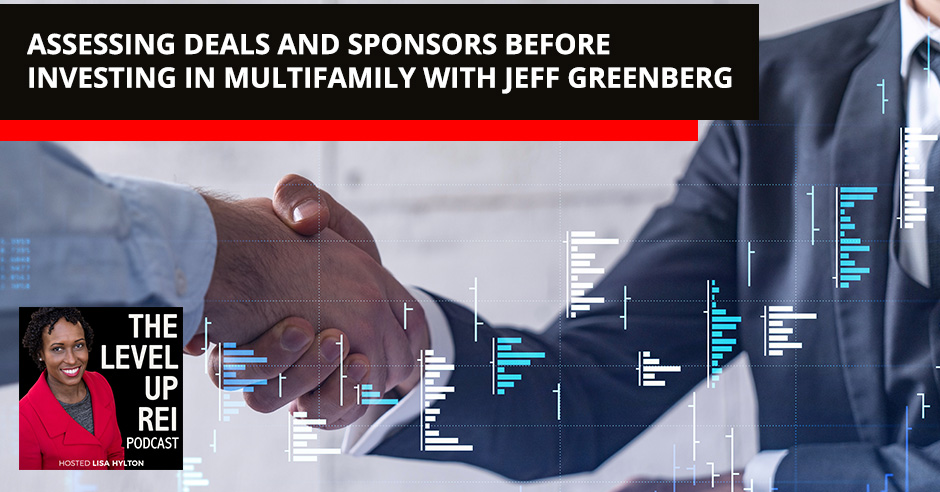
Investors, in most cases, look at the deals first before deciding whether to grab them or not. Today’s guest explains why looking at the operator first instead of the deal is a priority. Jeff Greenberg, the CEO of Synergetic Investment Group, sits down with Lisa Hylton to discuss assessing multifamily deals and sponsors. He shares his approach to multifamily assets and provides some insights outside multifamily regarding the present market. So, if you want to invest in multifamily, hit that play button now and discover golden nuggets.
—
Watch the episode here
Listen to the podcast here
Assessing Deals And Sponsors Before Investing In Multifamily With Jeff Greenberg
On the show is Jeff Greenberg. He is the CEO of Synergetic Investment Group, LLC. For the past several years, he has managed all aspects of commercial real estate ownership including acquisitions, operations, value-add, dispositions, and investor relations. SIG focuses on helping high-net-worth individuals passively invest in best-in-class commercial real estate, syndicators, and deals using a customizable private equity fund as the vehicle to help diversify investment portfolios. He has also run real estate meet up since 2005 and has been featured as a speaker on over 50 real estate podcasts and is a sought-after public speaker. Jeff, I’m super excited to have you on the show. Welcome on.
Thank you. This is going to be fun.
We met many years ago. I moved to LA in 2014 and I went to one of your meetups that you used to have in West LA back in the day. You were talking about syndication back then. I want to say this had to have been like 2016 or 2017. It’s been a journey. I want to jump right in on this episode a lot. I know you a bit so I also know that you’ve invested largely in the multifamily space and you’ve played heavily in that space. Can you give readers a little bit of background in terms of how you got started in multifamily investing?
The first commercial property we bought was about 2010. Prior to that, we were looking at residential, but it wasn’t a great time to be looking at residential properties because the values were so much influx because of the recession. When we realized that we could leverage other people’s money with commercial real estate, we started looking at that in about 2008. I didn’t buy my first property in until 2010, but realized that commercial real estate was a lot more lucrative and exciting, and started pushing in that direction and never looked back.
Many people always say that commercial real estate is more lucrative than single-family and residential. When you say residential, you are talking single-family, probably some duplexes, triplexes, and fourplexes. Can you elaborate on what are the key drivers that make commercial real estate? I’m assuming by commercial real estate you mean multifamily more lucrative than single-family and the smaller investments.
The part that excited me was how much control you had over the value of the property. In residential, no matter what you did to your property, you were limited on the value of your property based on your comparables and comps. You could have the best property in the neighborhood and you are still not going to have a much greater value than the rest of the properties in that neighborhood.
Where in commercial real estate, if you added value to the property, something that increased the desire for people to come to your property and increase your bottom line, your NOI, you increase the value of the property regardless of what the value of the property may be in the neighborhood. Even though that did have some effect, location is important. By adding desirability to your property, you can increase value. That was exciting to me because it gave you a lot more in the way of options for increasing the values.
You continue to play heavily in the commercial real estate space and you do so by using a vehicle, a private equity fund that you’ve created to invest. I talked a little bit about it in your bio. It’s providing diversification for investors and access to high-quality operators. Can you talk a little bit about the decision to pivot from operating to then managing the fund?
Adding desirability to your property allows you to increase its value more. Share on XOperating the multifamily can be pretty daunting as far as all the different things that you need to do. That’s why when people talk about commercial real estate, it takes a team. I have had teams of one person. I have had teams of ten people that I work with on all different kinds of deals and we have been successful. I’m in the stage where I would rather focus on the part that I enjoy, and that’s working with people and helping people get educated about the business of the commercial real estate. I’m working with investors.
I realized that I wasn’t so excited about operations, even though all my properties had property managers. In most of the cases, I had asset managers, which is the person that took the role between property management and ownership that controlled that aspect of it. Sometimes I was the asset manager. I’m an asset manager on one property that we are in the process of selling, but I realized that operations weren’t the piece that I like. I analyzed deals for years but that didn’t excite me. Broker relationships weren’t the part that excites me.
The part that I like now is helping introduce people to the business and helping them make money on their money. It’s a lot more exciting. The fact of helping people get into deals became exciting. The other piece was that I have exited a bunch of deals and I have money of my own that I need to disperse and need to get into deals. While I have to do research in order to decide whether or not I want to put my money into these deals, I’m saying, “I can leverage that experience and all of that effort that I’m taking for my own money and bring other people in with me.” I get to do both things. I get to bring my money in and I get to help other people. I get to do it as a fund manager.
To me, doing it that way was a lot more exciting. This customizable fund that I’m involved with, made it much easier to do it. I could go and look at all kinds of deals, not just multifamily but other commercial real estate deals and even non-real estate deals and bring investors in with multiple different sponsors, multiple different asset types, and multiple different criteria.
We may have some deals that are mainly cashflow. We may have some deals that are mainly increasing capital, and increasing value. We may have some that are both. The beauty of this structure is that people can pick and choose and say, “I want only want cashflow. I only want a capital increase. I want both.” That part of it makes it a lot of fun to be able to find good quality deals to bring to the investors, and then the investors get the final say if that’s something that they want to be into. It’s enjoyable and satisfying and I’m having fun with it.
This perfectly lines up with the next part of my questioning here. One of the key things that you mentioned is that you help people get into deals. Focusing on multifamily first, what are some of the things that investors need to know about investing in multifamily in the current market environment of rising interest rates and higher inflation for multifamily specifically?
As always, we are betting on the jockey. I won’t go deeply into it, but the operator is the key. The operator is the one flying the plane and they are more important or at least equally as important as the deal itself but that’s the first thing. A lot of people go to the deal first. They say, “Look at this IRR. Look at these returns. This is great.” Maybe take a little look at the operator. To me, the operator is number one. Let’s go back to your question as far as this environment we are in now. There are a couple of things.

Multifamily Deals And Sponsors: Always go to the county assessor and learn how they figure out and analyze the taxes. That way, you can project ahead.
First of all, I want to know how conservative the underwriting is, these projections. That’s why I want to know the operator first. If I trust the operator, I’m going to trust the numbers a lot more than if I don’t trust the operator or if I’m hesitant. If I trust the operator, I’m going to go look at the numbers and make sure I agree that these are conservative numbers because everybody’s going to say that. I’m also looking to see in this environment, “What are their reserves? What are they leaving in reserve in case things don’t quite go the way that we hope that they go with an increase in rents and occupancy?”
Reserve is number one. Number two is the loan. What flexibility do we have in that loan? What happens in a few years? We have a lousy market. We can’t sell and the loans are coming due. What are our options in there? The market is important. What’s going on in the market? How diverse is the market? I don’t like single or limited employment variety in the market.
Jobs are coming in and you’ve got a limited type of market like with the auto industry where all of a sudden, you had problems in the auto industry. Maybe it’s the military. A little caveat on that though is when it’s student housing, you are looking at one resource. You are going to look at the viability of the school because that’s important.
A lot of times you want to see the diversity of employment. Those are big things. I want to know what projections are looking at that if rents are flat. Maybe occupancies are flat. Maybe occupancy goes down. On the sale of the property, what are their projections as far as the cap rate? What happens if the cap rate expands and the value of the property is down? Are we still going to be able to get out of this deal? Hopefully, with a profit, but how far are they bordering on or relying on the cap rate?
The other thing is break-even. A lot of times you get into deals and your break-even ratio is high. We want to be careful about a break-even ratio that’s high and all of a sudden, we are not able to increase rents and we are not breaking even until we are 90% occupied and we are 85% occupied, or we are 80% occupied. You are looking in some risky territory. I do want to know what the break-even occupancy is, and what’s the projected break-even occupancy coming up in years 1 and 2. Where are we?
I would much rather look at a lower IRR, a lower return when I know that I’m working with a conservative operator. Back to the loan, what’s the loan-to-value? Somebody is getting an 85% to 90% loan. You are taking on a lot of risks. I like the people now that are looking at some of these 65% to 70% loan-to-value. That gives you a lot more runway in case things go south or plans don’t quite go where they are. That’s where I’m looking at as far as what’s going on in the environment. Interest increases are our exit. If interest is up, who’s going to buy the property? What effects is it going to be on the buyer?
A recap on some of this. From a break-even ratio, higher break-even ratios indicate higher risk because that means that the property will need to be fully occupied in order for it to make economic sense to run the business. Being able to see probably 50%, 60%, and 70% break-even ratios are probably healthier break-even ratios and occupancy ratios. Would you agree with that or not?
Operating a multifamily can be pretty daunting when it comes to all the different things you need to do. That's why it takes a team to work on all kinds of deals when discussing commercial real estate. Share on XIn the multifamily world, I don’t know that I have ever seen a 50% or 60%. I have seen 65%. I have had property at 70% occupancy. When we bought it, it was 85% occupancy, and in a few months, we were down to 66%. That was a painful lesson until we were able to get it back up to 70%. Mainly the break-even occupancy does not make any profit. That’s paying the bills. That’s making sure that we are not coming out of pocket to pay the bills.
When we were at 66%, we were coming out of pocket to pay the bills until we were able to turn that back around. That was an experience that wasn’t fun. Some of these people are looking at a 90% break-even. You get down this 80% occupancy. You are having to pay the bills and that’s where your reserve comes in. You better have some reserves around to protect yourself so you don’t go into default.
One question in the multifamily space, metrics-related, is expense ratios. What is a reasonable expense ratio for the multifamily space, given your experience operating?
For the most part, the 50% rule is pretty good. It depends on some newer products, maybe lower. I have seen student housing lower because you are getting a lot more money for the product so you are expense ratio may not be as high. Sometimes that doesn’t work because, in student housing, you have a much higher turnover so your turnover costs end up cutting into that.
I remember looking at a property up in Midland, Texas when the oil boom. They had a 25% expense ratio because it was a new property and the rents were through the roof. It was crazy. There was a 25% expense ratio, but for the most part, you don’t see that. When you get to smaller properties, maybe 30 to 40 units, you might see lower expense ratios. On average, when you go to the 100-plus units, usually you are in the 50% range.
Diving into expenses themselves. I personally think that like taxes is a big-ticket item as an expense to look at from an investor’s point of view to make sure that the operator is planning accordingly for that. Are there other expenses other than taxes or do you even agree on taxes? Maybe you have a different opinion in terms of the different expenses and line items that are super important to be looking at.
Your big items are your taxes and insurance. Especially in our environment, insurance depending on where you are located is a huge one. Probably your biggest items are taxes, insurance, and payroll. You want to look at those and see where they are going. The other one you may have is utilities. What’s going on with the utilities and if you are able to build back on the utilities? Those are probably your bigger ones and you want to make sure that you are projecting. At least you are finding out what the projections are.

Multifamily Deals And Sponsors: You better have some reserves around to protect yourself, so you don’t go into default.
Especially with taxes, we would always go to the government offices and talk to them because usually that’s controlled by the county. We would always go to the county assessor and find out exactly how they figure out the taxes, and how they analyze them, and then that way, we can project ahead. Insurance is a little bit different because they are going crazy and it also depends on your environment. It depends on where you are, if you are in a flood zone, if you are in a high wind zone, or if you are near the coast.
One of the questions I remember having when we bought in Houston was, “How far are you from saltwater? Are you within 25 miles of saltwater, the river there, the canals, or the harbor there?” We want to find out if that was saltwater or freshwater because they wanted to know if we were 25 miles from saltwater which I thought was an interesting question. Are you in a flood zone? Insurance is going to go higher. Knowing all those things and getting a good insurance estimate is crucial.
On the income side, one of the biggest things is people pushing rent without a fact. A lot of people feel that they can add value by executing a value-add plan, and then turning around and pushing rent. On the value-add plan, based on your experience as an operator, what would you say is a reasonable budget that you typically look at when a value-add opportunity is presented to you in terms of CapEx?
That is so dependent on the field. That one is tough because it depends. If we are talking about an A-class building that was built within the last few years, they may be very little you need to do as far as a value-add. A lot of the value-adds, maybe you can add amenities, or maybe you could have some premium offerings. In a C-Class property or something, you may have some major renovations, but then again, you don’t want to over-renovate. I couldn’t give you a number because it’s going to depend so much on the particular deal.
The plan essentially that they are planning on executing.
We had a C-plus property we wanted to push to a B. There were certain things that we needed to do. We wanted to improve the dog park, but we also wanted to fix up the insides to try to get some of these nurses and younger doctors. Most of the older doctors were buying their own houses, but some of the younger doctors were interested in coming to our property, so there were certain things that we needed to do to fix it up.
It depends a lot on the plan how much things are going to cost. It could be small upgrades, or it could be little. We bought a property that was three years old and there wasn’t much that we were going to be able to do to improve the property. Sometimes it may be a management issue. Maybe we are going to improve the people running it. The property itself may not have that much that needs to be done on it, but maybe it’s being mismanaged. Maybe mom-and-pop are running it. It’s 100% occupied but they haven’t touched anything. They haven’t improved anything. Maybe it’s a management issue and you don’t have to put that much into the units.
It's essential to look at what's happening in a particular market to see if it can sustain itself. Share on XThis is probably a controversial topic, but what are your thoughts on the trend of rents continuing to increase in many of the hot markets across the country such as Phoenix, Tucson, and different cities in Texas? What are your thoughts there as you talk to investors who are thinking, “Will the champagne keep running?”
It’s a good question as far as will it, and that’s one of the things that I’m always looking at. When I look at a deal, I’m looking at, “What if the champagne stops running? How does the deal go? Can we still survive? Can the deal still do well?” My big thing is, number 1) Never lose money. I’m always looking at protecting the downside. Number 2) Let’s make money for everybody. If the champagne stop running, are we going to be able to survive?
We are not going to make as much of a profit, but that’s fine. We still need to make sure that we are going to protect our investors and this investment. It depends again on the market. When is the music going to stop? I don’t know when the music’s going to stop, but it’s important to look at what’s going on in a particular market to see if it could still sustain itself. When is it going to be that the people living here can’t afford to get in the increased rents? That’s an important item to be looking at when you are making these wonderful projections.
The other thing is comps. I always like to look at it. When we talk about increased rents, has it been proven on this property? Have they converted some units and shown me that we can get this rent on this property? If we haven’t done it on the property have some of our comps done it? It has to be a comp. We don’t want to deal with a property that’s in a different neighborhood or much newer than ours or has totally different demographics.
Is there a comparable that has raised rents to this level? If we don’t see that, we can look into the market but that’s not as convincing. I want to know. Have rents already been brought to this level? We don’t typically want to be at the tip of the spear and take the risk that we feel that we could raise these rents and nobody else has done it yet.
Many people who are investing passively might not know a lot about these topics, questions to ask, and things to uncover. That’s why they are reading episodes like this to get educated. Secondly, they are also looking for people who have experience and track record of working in that particular asset class and market to then be able to fill the gaps in a way in some of those areas as well.
It’s funny that you should mention that I do have a free book for your readers. If you go to SIGCRE.com/sponsor, there’s a book on questions to ask your deal sponsor. It will give people an idea of some of the questions to ask the deal sponsor about them. There’s another one that they could also get which SIGCRE.com/deal. These are questions to ask about the deal. At first, it’s about the sponsor and then about the deal.

Multifamily Deals And Sponsors: Having phenomenal returns in the past doesn’t mean you will have phenomenal returns in the future.
This brings me nicely to investing in new asset classes. Up until this point, we have been talking primarily about multifamily, bread and butter, and all that good stuff. When you look to invest outside of multifamily, what’s been your approach and lessons learned?
The main lesson is finding an expert in that field, especially if I don’t have a real strength in it. It’s the same as the passive investors coming in and finding good deal sponsors. I’m going to go and look and find the good deal sponsors as well. I don’t just jump into deals. I want to learn about that business. I want them to teach me what I need to know and go to other people and learn what’s important in this business. What is the risk? What are the rewards? What’s their experience been?
The problem I’m seeing especially in the multifamily area is that we have been in such a fabulous market for probably the last several years that there are a lot of people out there that feel their geniuses because they have gotten phenomenal returns. We have had phenomenal returns in the past and that doesn’t mean that they are going to have phenomenal returns in the future.
You started out this show talking about some of the things that are going on with increased interest rates and the possibility of a recession, and a lot of other things that are going on. We need to have people that are looking ahead and not relying on the past to boost them up. It’s the jockey. Find the quality jockey that we are willing to get into. You don’t need to rush into something. When someone’s telling you, “Hurry up. You got to do this now,” maybe you need to go and look elsewhere and do it when you are ready and feel prepared, or you find someone that you trust that will help to advise you.
I agree because there are a lot of deals and a lot of opportunities all the time. It’s important to be informed and aware of what it is that you are doing. These investments aren’t like investing in stock so you can’t sell your stock once you are in that syndication deal that you are in. You want to be able to feel comfortable that you’ve made the right decision and to go forward from there. This was a pleasure having you on. I’ve learned so much information about your experience as well as multifamily and also looking at different asset classes as well. If readers want to learn more about you, where is the best place they can go to learn more?
They could go to my website www.SynergeticIG.com. I’m going through it and making sure all the links work. It just went up. It’s in beta at the moment but you could get a lot of information about my website.
It was a pleasure having you on. Thank you so much, Jeff.
Thank you, Lisa. This is great.
Important Links
About Jeff Greenberg
 Jeff Greenberg, Jeff is the CEO Synergetic Investment Group, LLC (SIG). For the past 13 years he has managed all aspects of commercial real estate ownership including acquisitions, operations, value add dispositions, and investor relations. SIG currently focus’ on helping high net worth individuals, passively invest with best in class Commercial Real Estate syndicators and deals. Using a customizable private equity fund as the vehicle to help diversify investment portfolios.Jeff has run REI meetups since 2005 and has been the featured speaker on over 50 Real Estate Podcasts and is a sought after public speaker.
Jeff Greenberg, Jeff is the CEO Synergetic Investment Group, LLC (SIG). For the past 13 years he has managed all aspects of commercial real estate ownership including acquisitions, operations, value add dispositions, and investor relations. SIG currently focus’ on helping high net worth individuals, passively invest with best in class Commercial Real Estate syndicators and deals. Using a customizable private equity fund as the vehicle to help diversify investment portfolios.Jeff has run REI meetups since 2005 and has been the featured speaker on over 50 Real Estate Podcasts and is a sought after public speaker.
Love the show? Subscribe, rate, review, and share!
Join The Level Up REI Podcast Community today:

Recent Comments